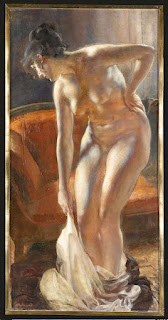El arrecife, de Edith Wharton (traducción de Juan Jesús Zaro), Alba Editorial. Fragmento I
De vez en cuando, algún ruido en la habitación contigua le representaba con mayor intensidad la realidad de la situación y la singularidad de aquella inmensa y abigarrada soledad que los acogía a los dos momentáneamente, entre largas filas de habitaciones, cada una de ellas con un secreto distinto. La proximidad de todos aquellos misterios que rodeaban los suyos deparó a Darrow una sensación aún más cercana de la presencia de la muchacha, y a través del humo del puro su imaginación la acompañó mientras se movía de aquí para allá, acarició la curva de sus brazos jóvenes y esbeltos mientras los levantaba para soltarse el cabello, imaginó cómo se bajaba el vestido hasta la cintura y luego hasta las rodillas, así como la blancura de sus pies mientras se deslizaban por el suelo hasta la cama...
Entonces se levantó de la silla y se desperezó mientras bostezaba y tiraba lo que quedaba del puro. Sus ojos, al seguirlo, se posaron en el telegrama que había arrojado al suelo. De pronto cesaron los ruidos de la habitación contigua y otra vez se sintió solo y desgraciado.
Abrió la ventana, colocó los brazos en el alféizar y contempló la masa urbana salpicada de luces. Luego alzó una mirada al oscuro cielo, en el que brillaba el lucero del alba.
Libro primero. Capítulo V.
Albert Besnard. Nu. 1916. Musée d’Orsay
--------------------------------------------------------------------------------------------------------------------------
Now and then a sound from her room brought before him more vividly the reality of the situation and the strangeness of the vast swarming solitude in which he and she were momentarily isolated, amid long lines of rooms each holding its separate secret. The nearness of all these other mysteries enclosing theirs gave Darrow a more intimate sense of the girl’s presence, and through the fumes of his cigar his imagination continued to follow her to and fro, traced the curve of her slim young arms as she raised them to undo her hair, pictured the sliding down of her dress to the waist and then to the knees, and the whiteness of her feet as she slipped across the floor to bed...
He stood up and shook himself with a yawn, throwing away the end of his cigar. His glance, in following it, lit on the telegram which had dropped to the floor. The sounds in the next room had ceased, and once more he felt alone and unhappy.
Opening the window, he folded his arms on the sill and looked out on the vast light-spangled mass of the city, and then up at the dark sky, in which the morning planet stood.



Comentarios